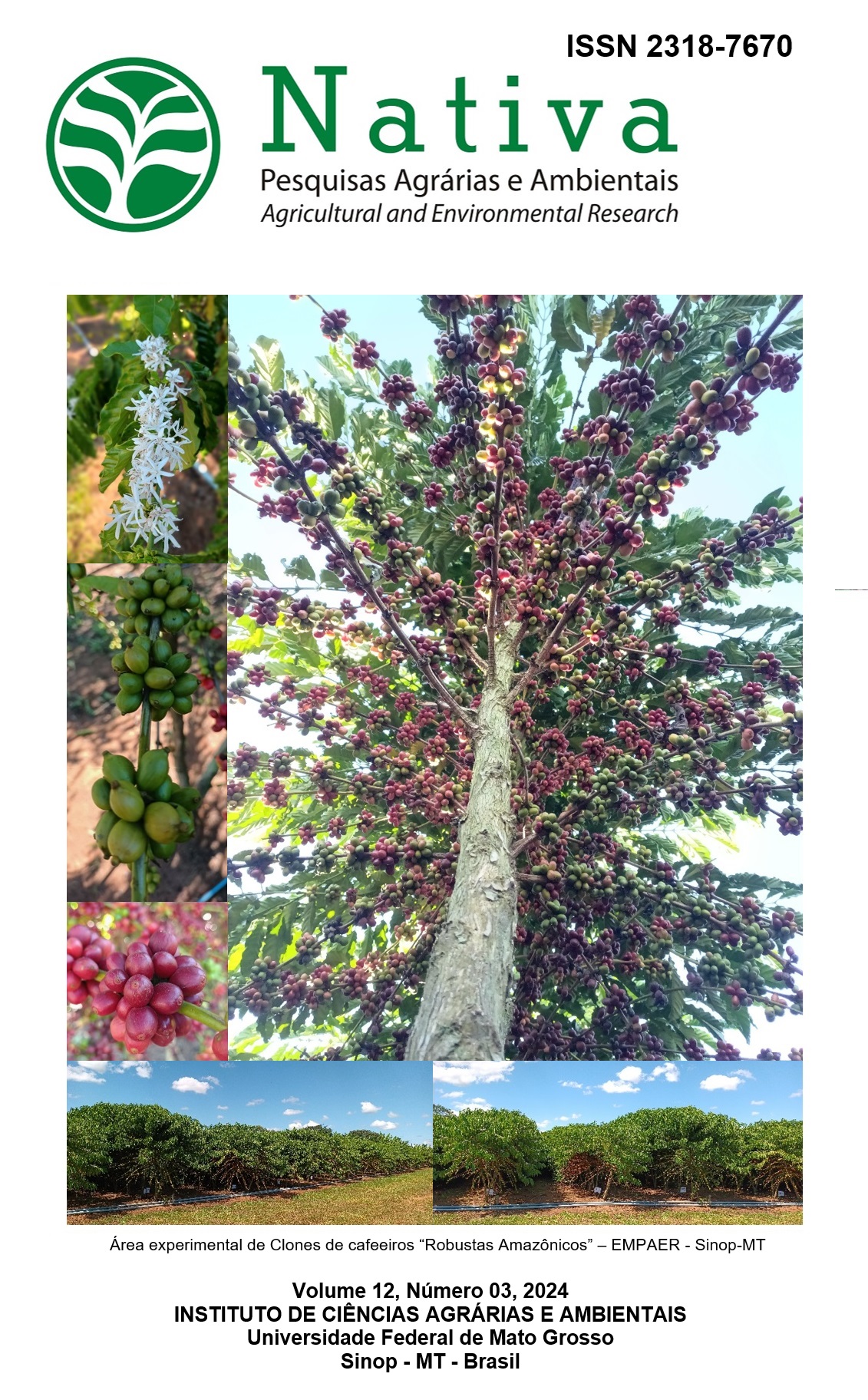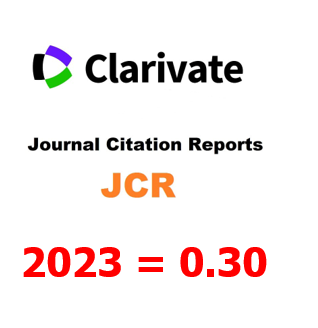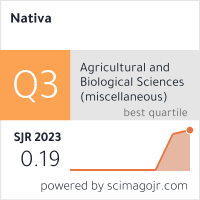PALMA FORRAGEIRA IRRIGADA COM ÁGUA SALINA SOB DENSIDADES DE PLANTIO EM TRÊS CICLOS PRODUTIVOS
DOI:
https://doi.org/10.31413/nat.v12i3.16356Palavras-chave:
manejo de irrigação, Opuntia ficus-indica, salinidadeResumo
O objetivo com o presente estudo foi avaliar a produtividade e a eficiência do uso da água da palma forrageira ‘Gigante’ irrigada com água salina, sob densidades de plantio, ao longo de três ciclos de produção, em Guanambi, Bahia. O delineamento experimental foi em blocos casualizados com três repetições, em esquema de parcelas subdivididas no tempo, sendo alocadas nas parcelas quatro densidades de plantio (20, 40, 60 e 80 mil plantas ha-1), nas subparcelas três lâminas de irrigação (11, 22 e 33% da ETo) e o tratamento sem irrigação, e nas subsubparcelas, três ciclos de produção. A evapotranspiração de referência (ETo) foi obtida pelo método de Penman-Monteith FAO 56. A irrigação foi realizada via gotejamento com turno de rega de 7 e 14 dias. O aumento das lâminas de irrigação promove redução no teor de matéria seca (MS), independente do ciclo de produção. A maior produtividade de massa verde (PMV) foi obtida no primeiro ciclo de produção, com aplicação da lâmina de 33% ETo. Para produtividade de matéria seca (PMS) a aplicação das maiores lâminas de irrigação refletiu-se apenas no primeiro ciclo de produção. A lâmina de irrigação de 33% ETo reduz a eficiência do uso da água (EUA). O aumento da densidade de plantio até 80.000 plantas ha-1 favorece PMV, PMS e a EUA para massa verde ao longo dos três ciclos de produção. A EUA para matéria seca responde positivamente até uma população de 50.000 plantas ha-1. Aumentar as lâminas de irrigação em até 33% da ETo reduz o número de plantas mortas ao longo dos ciclos.
Palavras-chave: manejo de irrigação; Opuntia ficus-indica; salinidade.
Forage cactus pear irrigated with saline water under planting densities
in three production cycles
ABSTRACT: The objective of this study was to evaluate the productivity and water use efficiency of ‘Gigante’ forage cactus pear irrigated with saline water, underplanting densities, over three production cycles in Guanambi, Bahia. The experimental design was randomized blocks with three replications in a split-plot scheme in time, with four planting densities allocated to the plots (20, 40, 60 and 80 thousand plants ha-1), three irrigation depths (11, 22 and 33% of ETo) and the treatment without irrigation in the subplots, and three production cycles in the subsubplots. The reference evapotranspiration (ETo) was obtained by the Penman-Monteith method FAO 56. Irrigation was carried out via drip irrigation with an irrigation period of 7 and 14 days. Increasing the irrigation depths promotes a reduction in the dry matter (DM) content, regardless of the production cycle. The highest green mass productivity (GMP) was obtained in the first production cycle, applying the 33% ETo water depth. For dry matter productivity (DMP), applying the highest irrigation depths was reflected only in the first production cycle. The 33% ETo irrigation depth reduces water use efficiency (WUE). Increasing the planting density to 80,000 plants ha-1 favors GMP, DMP and WUE for green mass over the three production cycles. WUE for dry matter responds positively to a population of 50,000 plants ha-1. Increasing the irrigation depths up to 33% of ETo reduces the number of dead plants over the cycles.
Keywords: irrigation management; Opuntia ficus-indica; salinity.
Referências
ALLEN, R. G.; PEREIRA, L. S.; RAES, D.; SMITH, M. Crop evapotranspiration: guidelines for computing crop water requirements. Irrigation and Drainage. Rome: FAO, 1998. (Irrigation and Dranaige Paper, 56).
AYERS, R. S.; WESTCOT, D. W. Water Quality for Agriculture. Rome: FAO, 1985. (Irrigation and Drainage Paper, 29, Rev. 1.)
CAMPOS, A. R. F.; SILVA, A. J. P.; LIER, Q. J. V.; NASCIMENTO, F. A. L.; FERNANDES, R. D. M.; ALMEIDA, J. N.; PAZ, V. P. S. Yield and morphology of forage cactus cultivars under drip irrigation management based on soil water matric potential thresholds. Journal of Arid Environments, v. 193, e104564, 2021. https://doi.org/10.1016/j.jaridenv.2021.104564
CASTRO, I. N.; SANTOS, S. R.; KONDO, M. K.; MAIA, V. M.; SANTOS, C. C. R. Agronomic performance and water use efficiency of irrigated cactus pear cultivars. Revista Caatinga, v. 33, n. 2, p. 529-540, 2020. https://doi.org/10.1590/1983-21252020v33n225rc
CAVALCANTE, L. A. D.; SANTOS, G. R. A.; SILVA, L. M.; FAGUNDES, J. L.; SILVA, M. A. Respostas de genótipos de palma forrageira a diferentes densidades de cultivo. Pesquisa Agropecuária Tropical, v. 44, n. 4, p. 424-433, 2014. https://doi.org/10.1590/S1983-40632014000400010
COSTA, R. G.; TREVIÑO, I. H.; MEDEIROS, G. R.; MEDEIROS, A. N.; PINTO, T. F.; OLIVEIRA, R. L. Effects of replacing corn with cactus pear (Opuntia ficus indica Mill) on the performance of Santa Inês lambs. Small Ruminant Research, v. 102, n. 1, p. 13-17, 2012. https://doi.org/10.1016/j.smallrumres.2011.09.012
CRUZ NETO, J. F.; MORAIS, J. E. F.; SOUZA, C. A. A.; CARVALHO, H. F. S.; RODRIGUES, C. T. A.; SILVA, T. G. F. Aplicabilidade de indicadores agrometeorológicos para análise do incremento de água por irrigação em sistemas de produção da palma forrageira, cv. Miúda. Journal of Environmental Analysis and Progress, v. 2, n. 2, p. 98-106, 2017. https://doi.org/10.24221/jeap.2.2.2017.1170.98-106
DONATO, P. E. R.; DONATO, S. L. R.; SILVA, J. A.; RODRIGUES, M. G. V.; SANTOS, M. R. Indicadores técnicos, de produção e econômicos da cultura. In: DONATO, S. L. R.; BORÉM, A.; RODRIGUES, M. G. V. Palma forrageira do plantio à colheita. Belo Horizonte: Epamig, 2020a. p. 203-232.
DONATO, P. E. R.; DONATO, S. L. R.; SILVA, J.A.; LONDE, L. N. C.; RODRIGUES, M. G. V. Implantação da lavoura. In: DONATO, S. L. R.; BORÉM, A.; RODRIGUES, M. G. V. Palma forrageira do plantio à colheita. Belo Horizonte: Epamig, 2020b p.79-100.
DONATO, S. L. R.; ARANTES, A. M.; BRITO, C. F. B.; RODRIGUES, M. G. V.; SILVA, J. A.; DONATO, P. E. R. Considerações sobre clima semiárido e ecofisiologia da palma forrageira. Informe agropecuário, v. 38, p. 7-20, 2017a.
DONATO, S. L. R.; DONATO, P. E. R.; SILVA, J. A.; RODRIGUES, M. G. V. Diagnóstico nutricional e recomendação de adubação para palma forrageira ‘Gigante’. Informe agropecuário, v. 38, p. 46-58, 2017b
DONATO, S. L. R.; DONATO, P. E. R.; SILVA, J. A.; RODRIGUES, M. G. V.; RUFINO, L. D. A.; SILVA JUNIOR, A. A. Exigências nutricionais e sugestões de adubação para palma forrageira ‘gigante’. In: DONATO, S. L. R.; BORÉM, A.; RODRIGUES, M. G. V. Palma forrageira do plantio à colheita. Belo Horizonte: Epamig, 2020a. p.101-127.
DONATO, S. L. R.; BRITO, C. F. B.; FONSECA, V. A.; ARANTES, A. M.; SILVA, J. A.; DONATO, P. E. R. Aspectos ecofisiológicos. In: DONATO, S. L. R.; BORÉM, A.; RODRIGUES, M. G. V. Palma forrageira do plantio à colheita. Belo Horizonte: Epamig, 2020b. p. 43-77.
FONSECA, V. A.; DONATO, S. L. R.; SANTOS, M. R.; OLIVEIRA, C. M.; SILVA, J. A.; BATISTA, R. S. Morphometry and yield of forage cactus 'Gigante' under irrigation and different planting densities. Revista Caatinga, v. 36, n. 3, p. 690-701, 2023. https://doi.org/10.1590/1983-21252023v36n321rc
FONSECA, V. A.; DONATO, S. L. R.; SANTOS, M. R.; OLIVEIRA, C. M.; KONDO, M. K.; COTRIM, C. E. Nutrients in ‘Gigante’ forage cactus pear under different saline water irrigation depths and planting densities. Revista Brasileira de Engenharia Agrícola e Ambiental, v. 26, n. 5, p. 381-389, 2022. https://doi.org/10.1590/1807-1929/agriambi.v26n5p381-389
FONSECA, V. A.; COSTA, L. C.; SILVA, J. A.; DONATO, S. L. R.; DONATO, P. E. R.; SOUZA, E. S. ‘Gigante’ cactus pear cultivated at different population densities in a mechanizable arrangement. Revista Brasileira de Engenharia Agrícola e Ambiental, v. 24, n. 11, p. 769-775, 2020. http://dx.doi.org/10.1590/1807-1929/agriambi.v24n11p769-775
FONSECA, V. A.; SANTOS, M. R.; SILVA, J. A.; DONATO, S. L. R.; RODRIGUES, C. S.; BRITO, C. F. B. Morpho-physiology, yield, and water-use efficiency of Opuntia ficus indica irrigated with saline water. Acta Scientiarum. Agronomy, v. 41, n. 1, p. 1-11, 2019. https://doi.org/10.4025/actasciagron.v41i1.42631
MACÊDO, A. J. S.; CESAR NETO, J. M.; OLIVEIRA, L. B.; EDVAN, R. L.; SANTOS, E. M. A cultura da palma, origem, introdução, expansão, utilidades e perspectivas futuras: Revisão de Literatura. Brazilian Journal of Development, v. 6, n. 8, p. 62967-62987, 2020. https://doi.org/10.34117/bjdv6n8-652
MATOS, L. V.; DONATO, S. L. R.; SILVA, B. L.; ASPIAZU, I.; LANI, J. L. In what proportions to semi-arid agroecosystems and production systems modify the bromatology of the ‘Gigante’ cactus pear? Nativa, v. 12, n. 1, p. 24-36, 2024. https://doi.org/10.31413/nativa.v12i1.16507
QUEIROZ, M. G.; SILVA, T. G. F.; ZOLNIER, S.; SILVA, S. M. S. E.; SOUZA, C. A. A.; CARVALHO, H. F. S. Relações hídrico-econômicas da palma forrageira cultivada em ambiente semiárido. Irriga, edição especial, v. 1, n. 1, p. 141-154, 2016. https://doi.org/10.15809/irriga.2016v1n01p141-154
SÁ TELES, E. B.; ARANTES, A. M.; DONATO, S. L. R.; SOARES, R. S.; SILVA, J. A.; DONATO, P. E. R. Cultivares de Palma Forrageira sob Diferentes Arranjos e Densidades de Plantio. Revista Brasileira de Geografia Física, v. 17, n. 1, p. 157-177, 2024. https://doi.org/10.26848/rbgf.v17.1.p157-177
SANTOS, M. R.; BRITO, C. F. B. Irrigação com água salina, opção agrícola consciente. Revista Agrotecnologia, v. 7, n. 1, p. 33-41, 2016. https://doi.org/10.12971/5175
SANTOS, H. G.; JACOMINE, P. K. T.; ANJOS, L. H. C.; OLIVEIRA, V. A.; LUMBRERAS, J. F.; COELHO, M. R.; ALMEIDA, J. A.; ARAÚJO FILHO, J. C.; OLIVEIRA, J. B.; CUNHA, T. J. F. Sistema brasileiro de classificação de solos. Rio de Janeiro: Embrapa Solos, 2018. 356p.
SANTOS, M. R.; DONATO, S. L. R.; COTRIM JUNIOR, P. R. Irrigação na palma forrageira. Revista Agrotecnologia, v. 11, n. 1, p. 75-86, 2020. http://orcid.org/0000-0003-0896-0359
SENTELHAS, P. C.; MONTEIRO, J. E. B. A. Agrometeorologia dos Cultivos. In: MONTEIRO, J. E. B. A. Agrometeorologia dos cultivos: o fator meteorológico na produção agrícola. Brasília: Inmet, 2009. 530p.
SILVA, L. M.; FAGUNDES, J. L.; VIEGAS, P. A. A.; MUNIZ, E. N.; RANGEL, J. H. A.; MOREIRA, A. L.; BACKES, A. A. Produtividade da palma forrageira cultivada em diferentes densidades de plantio. Ciência Rural, v. 44, n. 11, p. 2064-2071, 2014. https://doi.org/10.1590/0103-8478cr20131305
SILVA, A. S.; SANTOS, E. M.; RAMOS, J. P. F.; PERAZZO, A. F.; MUNIZ, A. C. S.; SANTOS, F. N. S.; PEREIRA, D. M.; CRUZ, G. F. L. Características agronômicas de variedades de Opuntia cochenillifera e Nopalea cochenillifera sob diferentes densidades de plantio. Colloquium Agrariae, v. 15, n. 6, p. 88-96, 2019. https://doi.org/10.5747/ca.2019.v15.n6.a340
SILVA, E. C. B.; LIMA, J. R. S.; ANTONINO, A. C. D.; MELO, A. A. S.; SOUZA, E. S.; SOUZA, R. M. S.; SILVA, V. P.; OLIVEIRA, C. L. Efeito da Irrigação Suplementar na Produtividade e Eficiência no Uso de Água da Palma Forrageira. Revista Brasileira de Geografia Física, v. 13, n. 6, p. 2744-2759, 2020.
SOIL SURVEY STAFF. Keys to soil taxonomy. (12th ed.). Washington, DC: United States Department of Agriculture, Natural Resources Conservation Service. 2014.
SOUZA, M. T. C.; SILVA, M. E. F.; PAULO, P. E. M.; RIBEIRO, A. B.; ANDRADE, A. P.; CASSUCE, M. R. Caracterização climática e o efeito do estresse hídrico sob as plantas nativas da caatinga. Pubvet, v. 8, n. 1, p. 0001-0083, 2014. https://doi.org/10.22256/pubvet.v8n1.1655
Downloads
Publicado
Edição
Seção
Como Citar
Licença
Copyright (c) 2024 Nativa

Este trabalho está licenciado sob uma licença Creative Commons Attribution-NonCommercial 4.0 International License.
Direitos Autorais para artigos publicados nesta revista são do autor, com direitos de primeira publicação para a revista. Em virtude de a aparecerem nesta revista de acesso público, os artigos são de uso gratuito, com atribuições próprias, em aplicações educacionais e não-comerciais.
A artigos publicados nessa revista, podem ser reproduzidos parcialmente ou utilizados como referência por outros autores, desde que seja cita a fonte, ou seja, a Revista Nativa.
Copyright for articles published in this journal are the authors, with first publication rights granted to the journal. The journal shows open access, and articles are free to use, with proper attribution, in educational and non-commercial.
The articles published in this journal may be reproduced in part or used as a reference by other authors, provided that the source is quoted.






